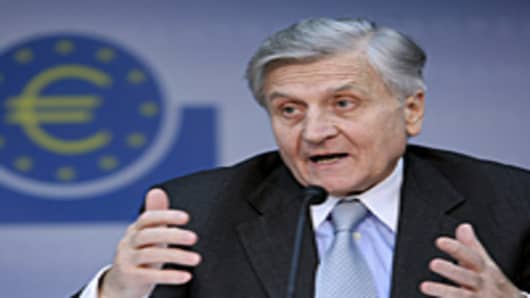In Jackson Hole, Wyoming, on Saturday, Jean-Claude Trichet, the president of the European Central Bank, was due to give a speech to a meeting of policy makers hosted by the Federal Reserve. As he prepared to speak, the euro zone faced huge problems.
The second rescue package for Greece is in doubt, the euro zone’s banking system remains a major worry, and only ECB intervention has kept borrowing costs for Spain and Italy at sustainable levels.
Leaders across the euro zone appear unable to agree on the terms of the rescue of Greece, raising questions about how they would cope if the crisis took an even worse turn.
The head of the International Monetary Fund, Christine Lagarde, summed up the mood in her own speech to the meeting in Jackson Hole perfectly. “Developments this summer have indicated we are in dangerous new phase. The stakes are clear, we risk seeing a fragile recovery derailed, so we should act now.”
The former French Finance Minister said Europe’s banking industry needs to be recapitalized whilst warning fiscal policy must aim boost growth and monetary policy remain highly accommodative.
It is difficult to argue with Christine Lagarde, but despite the importance of her role, she is able to say these things without causing panic. As head of the ECB, Trichet cannot speak his mind in public amid so much economic, financial and political uncertainty.
On Sunday, the Sunday Times in the UK reported that policy makers in Brussels are drawing up radical plans to offer central guarantees over certain types of debt issued by banks. The move is reported to be a direct response to the sharp fall in U.S. funding for Europe’s banks. If true, this is clearly something the boss of the ECB can't be discussing in public.
So as Trichet prepared for his speech, he turned to the history books and gave a master class on how to say something while actually saying nothing at all.
“Cracking open the Solovian black box of technical progress has taken us from theories of learning-by-doing, to the impact of R&D on product variety and quality,” said Trichet as he was about 5 minutes into the speech. The wire reporters must have been scratching their heads, which is exactly what I suspect was Trichet’s point. (Solovian growth is defined as economic growth brought about by investment. A black box is any system whose inner workings are unobservable—think Enron's business model. At any rate, yes, he actuallly said that.)
“Going one step further, investigation of the sources of this growth dispersion in the U.S. and euro area economies reveals parallels even in the root causes of dispersion in economic performance and productivity,” continued the central bank governor, in a heroic attempt not to mention anything investors actually wanted to hear.
He went on to reiterate things he had said many times before.
“Finally, a priority for medium and long-run growth is that our policy institutions remain attuned to an ever-changing landscape. We have seen in recent years the near-Knightian uncertainty policy makers endured and how boldly they responded,” said Trichet before bringing it home.
“I have learned whilst discussing global imbalances and financial transmission channels — much of it done here at Jackson Hole — that appropriate improvements in regulation and multilateral surveillance frameworks can yield large gains. We should work hard to maintain momentum,” he said.
That is clearly not all you have learned, Mr. Trichet, as you prepare to stand down later this year. I suspect you will be meeting with your replacement, Italy’s Maria Draghi, to pass on this incredibly important skill for a central banker in a time of crisis.



